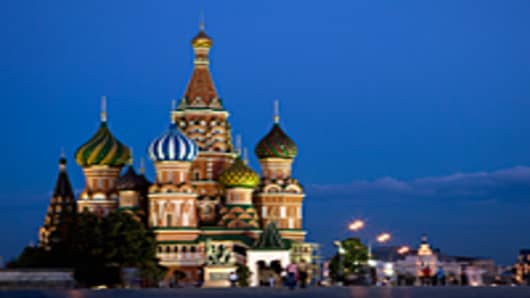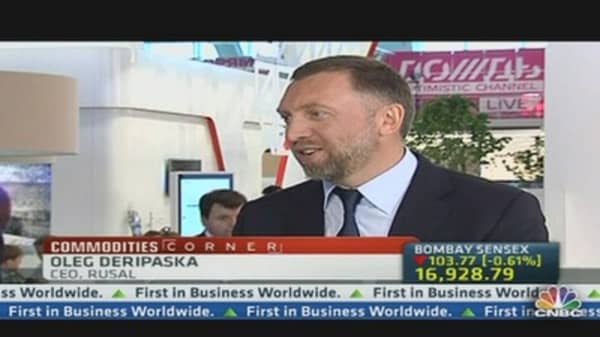The European Central Bank should act to weaken the single European currency to help the euro zone out of its debt crisis, Oleg Deripaska, the CEO of Russian aluminum giant Rusal,told CNBC in an interview on Thursday.
The euro zone debt crisiswhich has been going on for over two years, has impacted the world economy and needs to be solved quickly, bankers and officials said in a CNBC panel at the Saint Petersburg International Economic Forum (SPIEF).
"It's very serious because for almost two years nothing was done about it," Deripaska said. "Of course, the resolution would only be political, but there is no strong leadership [in Europe]."
Action from the ECB is the only way out, in his opinion, as it would offer the weaker euro zone members a much-needed boost in exports.
"Making the currency weaker is the only way for them [euro zone countries] to survive," he said. "Austerity measures are counter-productive. Less investment creates more problems."
Many analysts say that Russia is now in a much better position than euro zone countries, with its economic growth of around four percent, sovereign debt to gross domestic product of only 10 percent and a budget surplus last year.
But Deripaska said the country would progress even faster if Russian banks were able to lend more and at lower interest rates – something they are not able to do because of high solvency demands imposed on them by the central bank, wary after three banking crisis in Russia after the collapse of the Soviet Union in the 1990s.
"Russian banks are very conservative," Deripaska said. "Especially since we will join the World Trade Organization, we need to compete."
Deripaska, who pointed out that 70 percent of the loans granted in Russia last year were offered by three banks, said he was confident the Russian government will design measures to stimulate the economy and called on the Russian central bank to relax its rules for commercial banks' lending.
Slow Progress
Many investors have criticized what they called a slowdown in Russia's privatization program —the fact that President Vladimir Putin seemed to prefer to turn state-owned giant Rosneftegaz into a temporary buyer of assets from other energy companies slated for privatization.
Deripaska said this was "just an option."
"There were no shares bought by Rosneftegaz and I don't think they would buy [them]," he said, pointing out that organic growth was much better than a merger in many situations.
"It's such a stress test when you take over a company," Deripaska added.
Besides energy, agriculture, retail, services, construction, transportation and car making are sectors where Deripaska sees a lot of progress but, he added, the country's transition to a market economy was taking longer than initially hoped and he estimated it would only be complete in 2030.
He said he expected growth this year in the global aluminum sector despite the fall in prices, for which he partly blamed financial speculators but which, he added, will help companies in the sector trim costs and become more efficient.
"Long term, I believe consumption of aluminum will grow. Low prices help our customers and create opportunity for us in the future," Deripaska said.
"We need to produce as much as our customers want. The aluminum industry will be more efficient in handling the signals from the markets at the end of this [cost-cutting because of low prices] process," he added.
Watch the full interview on Squawk Box Europe on Friday, June 22, at 6 a.m. London time (1 a.m. New York time.)




